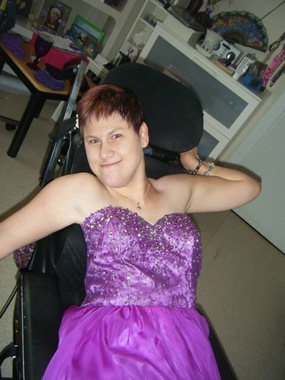Flick Hunt

Alternate Media
Flick' s Story
Flick's story is a compilation of her own notes and a recorded conversation with Flick and her support worker
Introduction
Flick: I am a 29 year old woman living independently in the community. I share with a friend living with a disability. I live with cerebral palsy and use a communication device to assist me with communicating and a wheelchair for mobility.
Researcher: Flick lives in a lovely old house in the community in a good residential area. She shares the house with a friend who also lives with disability.
Flick: I have a supportive family and they have supported me to take steps to live independently. Community living Project (CLP) also give me a lot of support to make choices about the way I want to live.
Researcher: CLP assist Flick to have a team of support workers who support her throughout the day with Disney different things. That includes everything she chooses to do such as personal care, recreational activities, casual employment activities, communication and paying bills. Flick indicates that having a good support team is essential for her to exercise control and choice, and to be able to live a good life.
Flick: I currently fulfil a number of valued roles - friend, granddaughter, daughter, sister, auntie, niece, cousin, tenant, traveller, consumer, car owner, workshop presenter, service user in local businesses, e.g. swimming, shopping, hotels, hairdressers.
There are many people in my life who aren’t paid supporters, including my family members, friends, and people I meet when I am participating in work, the community and recreation.
Goals
I have a number of personal goals. I want to:
- learn about my funding
- live by myself
- do more presentations;
- write and share my story more
- try new things
- spend time with friends
- spend time by myself.
I perceive there are a number of barriers to my personal goals, including:
- there is not enough funding to do what I want to do
- creating ideas
- learning and understanding how funding works
- I am nervous person learning to overcome my nerves and fears
- the communication tools I use are not perfect
- sometimes my support staff have difficulty understanding my devices when helping me to write and store presentations
- access
Presentations
Support worker: As a casual employee Flick is able to prepare presentations for workshops so she is able to earn some money. She has presented to school students living with special needs and currently presents in a series of workshops to increase understanding about how people living with disability are able to achieve a good life.
The presentations are educative about the experience of living with disability and how to improve one's life. The presentations are very well received with people indicating it is of great value to hear from a person living with disability about their experience of challenges and achievements. Workshop participants make special mention of the importance of Flick's presentation in the development of increased understanding. Flick indicates that sometimes it is frustrating for her not to not be able to communicate easily.
Recreation
Researcher: Flick enjoys going out and her support team assist her to do that. Most of all Flick enjoys going to the city for walks and shopping. She enjoys being around people. Flick indicates she prefers to relate to people one-on-one rather than in a group.
Although life can be difficult at times, Flick indicates that she is a happy and positive person. Sometimes she does feel down but she doesn't let it overwhelm her. Usually during these times she communicates with her support workers or family and friends.
Flick’s support worker reminds her that she is making one big change in her life at the moment. Flick is planning to move in approximately six months to house where she can live alone. Flick will enjoy the freedom of not having to worry about other people such as a housemate. She is in the process of accessing another house but it may take some time.
Working towards goals
Flick indicates that setting goals and working towards them has been important to her in getting a good life.
Support worker: Flick is a pro at getting a good life – she’s been doing it since the age of six or seven. It’s really important to Flick to make her choices. She doesn't want to feel like she's sitting there doing what other people say when she doesn’t want to be doing that. For Flick it is about choosing support workers, choosing friends, choosing what she will do each day, when she will shower, what she will wear and eat. Flick wants to be, and is, in control of all aspects of her life.
Enabling factors
Researcher: Flick has identified four key factors that enable her to live a good life. These are:
- Having relevant support
- Having choice and control about what happens in her life
- Setting goals
- Being involved in the community through work and recreational activities
© Felicity Hunt 2013. Except as provided by the Copyright Act 1968, no part of this publication may be reproduced, stored in a retrieval system or transmitted in any form or by any means without the prior written permission of the publisher.